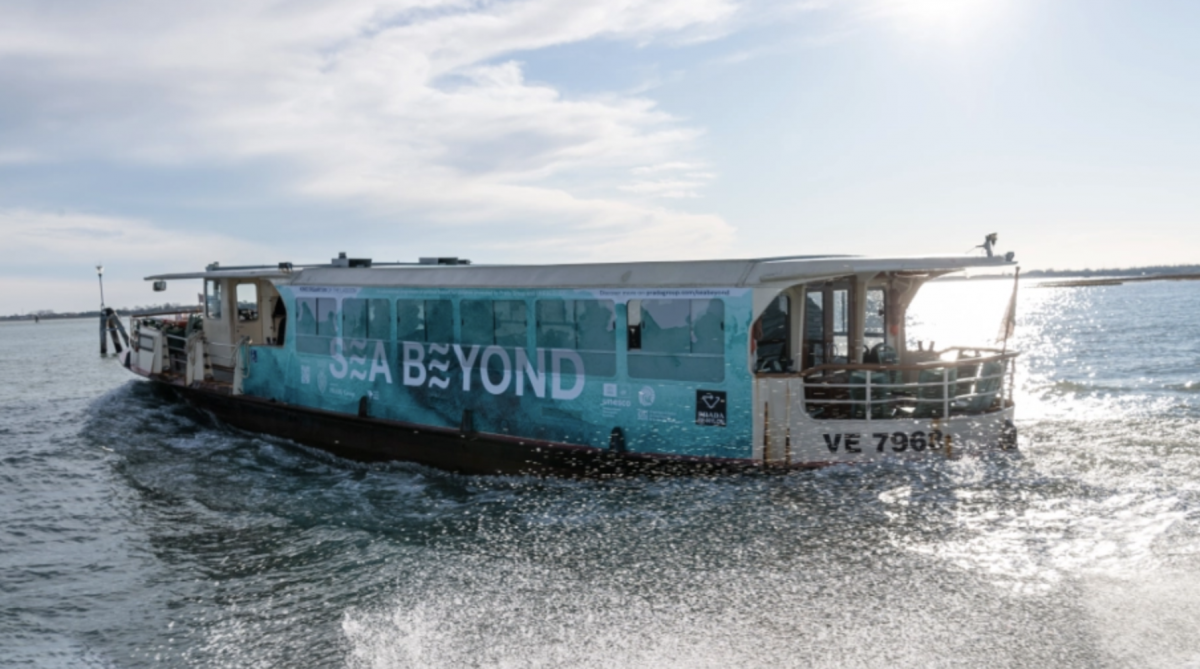Prada Group is to donate 1 percent of all revenues from its Re-Nylon collection to the Sea Beyond educational program — and the Italian brand is inviting its luxury peers to do the same.
Lorenzo Bertelli, Prada’s head of corporate social responsibility, swept into Paris on Tuesday to reveal the financial commitment — and an enhanced partnership with Sea Beyond — during the UNESCO Intergovernmental Oceanographic Commission’s Member States Assembly, which runs through Friday.
At a press conference attended by ambassadors from dozens of countries including Bangladesh, Iceland, Colombia, Chile and Indonesia, the executive said the scope of its partnership, initiated in 2019, would extend to ocean-related scientific research and humanitarian projects.
In addition, Intergovernmental Oceanographic Commission-UNESCO plans to establish an Ocean Decade Coordination Office in Venice to encourage the implementation of a “blue curriculum” across all of its 193 member states, plus a host of other initiatives.
Since Sea Beyond’s debut, more than 600 secondary school children in eight countries have completed its educational module, while about 120 preschoolers completed Kindergarten of the Lagoon outdoor lessons in Venice, Italy, earlier this year.
That may seem like a drop in the ocean, but Bertelli is convinced that “culture and education are fundamental for making change happen. We need to invest in a constructive dialogue with young generations to contribute to a more sustainable future and preserve our ocean.”
Midway through the press conference, the executive flashed a slide noting that there are about 1.8 billion students between the ages of 3 and 23 in the world, meaning Sea Beyond has so far reached only 0.0005 percent of the population.
The organization’s goal is to educate 10,000 students in ocean literacy by 2025, but it hopes to reach legions more.
Indeed, the ambition is to make Sea Beyond an open platform that welcomes third-party projects with ocean preservation principles at the core. IOC/UNESCO intends to scout relevant opportunities and will analyze and validate proposals submitted by Prada Group.
During the conference, Bertelli revealed that watchmaker Panerai, owned by rival luxury group Compagnie Financière Richemont, will join Sea Beyond.
During an interview with WWD, he declined to share details of Panerai’s commitment, but hinted there has been outreach to other luxury brands. “It’s a never-ending effort, and UNESCO is helping us. We want first of all to inspire.”
Bertelli also declined to quantify Prada’s annual contribution to Sea Beyond, but described it as “quite a lot of millions.”
He described a “multiplier” effect of its ocean-education efforts, since students often share their enthusiasm with friends and family member.
What’s more, there is a “scholastic system in place” in virtually every country, which he described as “a huge tool to do more on this matter.”
“This is the only way to shape the mind and hearts of future generations, so they have a more responsible behavior when they become entrepreneurs, or the manager of a country, or a prime minister,” he said in the interview. “We want to prove that this project is convenient for everybody — for us as a company, for the students and for everybody. And we want to lead the way and show that sustainability is convenient for everybody, also from the monetary perspective.”
He explained that “prevention is always less expensive than fixing a problem.”
Prada invited an array of speakers at UNESCO to underline the urgency of its mission.
Vladimir Ryabinin, executive secretary of IOC/UNESCO and assistant UNESCO director general, said Sea Beyond is “seeding ocean knowledge in the minds of school students from many countries. What a great way it is to make people kinder and ocean healthier.”
So far, schools in Brazil, China, Italy, Mexico, Peru, Portugal, the U.K. and South Africa have completed modules.
Giovanni Chimienti, a marine biologist at Bari University, flashed slides of some of the dazzling coral forests he’s discovered in the Mediterranean Sea, noting that more than half of coral species live in the deep sea, including black varieties that live long and grow very slowly.
The oldest he’s discovered is 2,100 years old, not far from the Italian coast. He stressed the need to educate local communities about such “hidden treasures.”
“It’s something people don’t see everyday, but it’s something they have to protect.”
The scientist noted that only about 3 percent of the deep ocean has been explored. “I’ve been in places where I’m the first person down there, and I’ve seen plastic,” he said.
While congratulating Prada Group and ICO on its projects during a question-and-answer session, the Iceland delegate highlighted that many adults perceive the ocean as a cold, dark and dangerous place. “Some people have not fallen in love with it,” she said.
Giant wave surfer Maya Gabeira, who never met a wall of water she didn’t love, spoke of the need to foster “awareness experiences” that awaken emotions. The audience gasped when a video was screened showing Gabeira riding a 73-foot wave in Portugal in 2020, setting a world record.
“The final goal is to live in harmony with nature,” she concluded.
Delegates and journalists also viewed a teaser for a documentary about the kindergarten program in Venice, showing toddlers riding in big canoes, netting samples from a stream, viewing teeming microorganisms under a microscope, and sharing their feelings about the sea.
Francesca Santoro, the ICO/UNESCO’s senior program officer, said the full film will be taken to documentary film festivals in the hopes of it landing on cinema screens, television and streaming services. “We protect only what we love,” she stressed.

